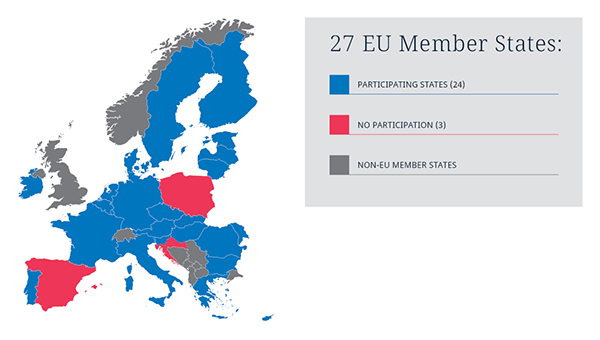The biggest game-changer in European patent law history
Overview
Contrary to the previous status quo, where European patents must be enforced and invalidated in each jurisdiction separately, under the new system European patents may be granted with unitary effect, enforceable across Europe with just one action before the UPC. All decisions taken by the UPC, including injunctions, damages and decisions on the validity of a patent (whether a UP or a traditional European bundle patent) will have pan-European effect, affecting almost the entire single European market with a population of some 400 million people.

The UPC has jurisdiction not only over the new unitary patents, but also for all existing and future European bundle patents, EP patent applications and supplementary protection certificates (SPCs). Thus, unless a holder of existing European patents decides to “opt-out” of the new system, those patents are subject to the UPC and its new procedural rules. The new system provides unprecedented opportunities, but it is complicated and comes with a number of pitfalls which could bring unpleasant surprises to those caught unprepared. Potential users of the new system need to educate themselves in order to make smart choices, to avoid being caught off guard and to take advantage of the new possibilities.
We at DLA Piper believe that we are uniquely positioned to help you navigate these uncharted waters. Our dedicated cross-border team of experienced patent litigation lawyers is based in all major European jurisdictions and has the experience and resources to provide advice and guidance for you to take full advantage of the new system. This site is DLA Piper’s hub for all information relating to this new era of patent litigation. It provides information on the new unitary patent, sets out the structure of the Unified Patent Court and keeps you up to date with the latest news and developments. For any further information, please get in touch with Gualtiero Dragotti or any member of our UPC team.
Featured insights
UPC Hub

Unitary Patent
Learn More
Unified Patent Court
Learn More
UPC Snapshot
Practical tips for your patent case
Podcast
Listen to the podcast
Resources
- Agreement on a Unified Patent Court (UPC Agreement)
- Regulation on the Unitary Patent (EU) No 1257/2012 (UPR)
- Regulation on the language regime for the Unitary Patent (EU) No 1260/2012 (UPTR)
- Rules of Procedure
- Overview of the cost of a unitary patent (provided by the European Patent Office)
- Protocol to the Agreement on a Unified Patent Court on provisional application
- Protocol on Privileges and Immunities of the Unified Patent Court
- CJEU's dismissal of the first Spanish challenge (Cases C-274/11 and C-295/11)
- CJEU's dismissals of the second Spanish challenge (Cases C-146/13 and C-147/13)
- Regulation (EU) No 542/2014 amending Regulation (EU) No 1215/2012 as regards the rules to be applied with respect to the Unified Patent Court and the Benelux Court of Justice
- Decision of the Administrative Committee under Article 87 (2) UPCA amending the Agreement (regarding the addition of Milan as a third location for the Central Division)










